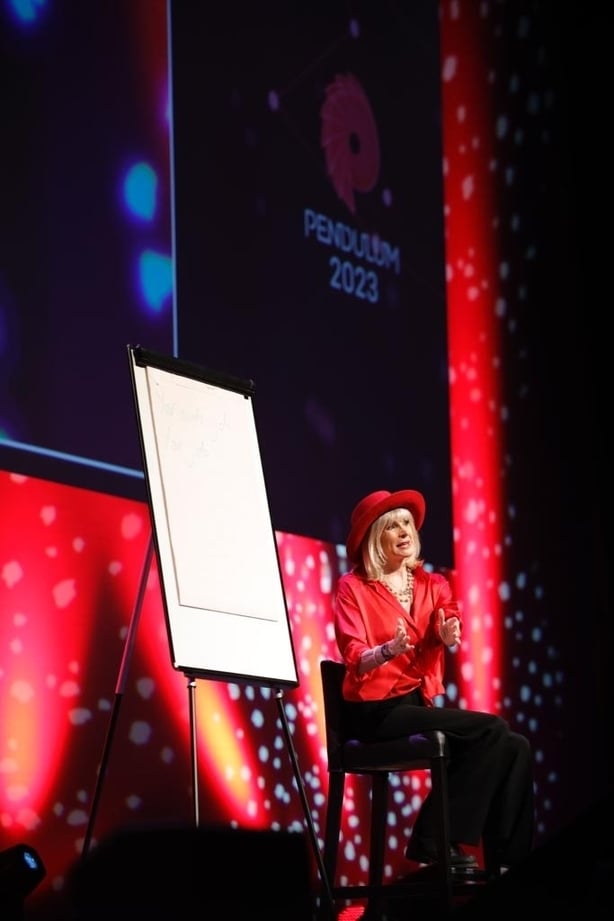In operation since 2014, Pendulum Summit is a world-class business and self-empowerment summit that invites some of the best and brightest minds of business, leadership, and culture to share their greatest learnings and insights under one roof.
Taking place at Dublin's Convention Centre, this year's event boasts a number of high-profile keynote speakers including Olympic champion Michael Johnson, performance guru Dr. Joe Vitale, race car driver Susie Wolff, and world-renowned therapist and author Marisa Peer.
Following her rousing talk, we caught up with Peer to discuss becoming the boss of your own brain, visualisation and why we should praise ourselves.

Peer is celebrated for her approach to therapy, having created a new modality called Rapid Transformational Therapy (RTT) that combines teachings from hypnosis, CBT (Cognitive Behaviour Therapy), NLP (Neuro Linguistic Programming) and psychotherapy to deliver treatment quickly.
"I always thought that therapy should be the same as every other healing modality like going to a doctor or a dentist or a chiropractor and it should offer you faster transformations", she told RTÉ Lifestyle. "I wanted to create a therapy that was rapid but very powerful."
She explained: "When you come in to see someone it's a three-step process." It begins with the therapist exploring why a client has a difficultly like anxiety, panic attacks or addiction. They then "remove that and code in something entirely different", with a recording made just for the client.
Many of the lessons she imparts through RTT are the same as what she discussed in her Pendulum talk, and are ways of becoming the "boss of your brain". It starts with how you speak to yourself and being gentle and encouraging, a hard learning curve for many of us here in Ireland.
"When you understand the mind, you understand that whatever you label yourself as, you become", she said. "If you walk around saying, 'I've got a terrible memory for two weeks', that will happen. If you say, 'I've got a phenomenal memory', that will happen too.
"The strongest force in every human is you must act in a way that lines up with how you identify. Your mind's job if to make your words real and your job is to make better words."
Being careful with what identifiers you attach to yourself is crucial, she said. "It's about learning not to identify yourself. The way we feel about absolutely everything bar none is down to two things: the pictures you make in your head and the words you say to yourself.
"When you have a brilliant brain, which everyone has, you have a choice every day: talk yourself into it, or out of it."
This is particularly vital when we catch ourselves complaining about parts of life that aren't that bad, Peer said, such as shopping for Christmas amid the festive crowds and thinking, 'this is hell': "Hell is not in a store that has food that you have money to buy, hell is not having any money to buy any food [and] no one wants to hang out with you anyway."
Peer told the Pendulum audience how, after an accident that left her leg broken, she relied on visualisation to heal and get back walking within five months. She said using images in how you think is a powerful tool for reaching goals.
"The mind only works in the present tense, it doesn't know next year, getting married to some great person or you're going to have a bikini body or you're going to be rich", she said. "It has to be now. It only responds to words that are vivid and powerful and make a picture.
"So saying, I'm not thinking of chocolate, of course [you are] because that's the picture you made."
"[It's like saying] Don't drink alcohol. You have to find a different way, [such as] alcohol is great at the weekend and everyone can have a few glasses of wine but then we stop and that's the joy. The mind understands that, it doesn't understand 'don't drink' or 'don't eat cake'."
Praise is another powerful method for transforming how you think about yourself and your life, she said.
"There is nothing, nothing that will build your self-esteem like praise. Self-esteem means what you think of you, and if you want to grow self-esteem and self-confidence, this is what works. Praise yourself: 'I am amazing person, I'm really kind, I'm incredibly smart, I'm good at numbers or figures or cooking'.
"If you say that you'll actually make that real. You need to up the praise but also minimise the criticism. The best way to grow self-esteem is praise yourself a lot. [be specific] Say something you can make real.
Praise, she concluded, "nourishes you, but criticism withers you".
To find out more about how to overhaul your mindset and work on self-confidence, watch our interview with Marisa Peer above.

